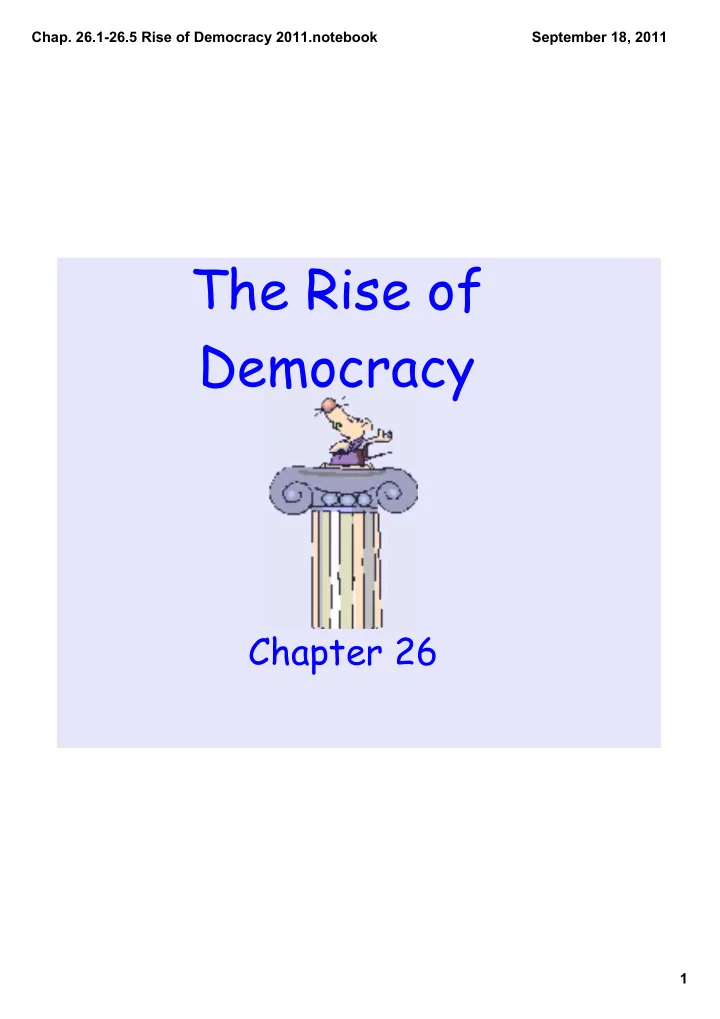

Chap. 26.126.5 Rise of Democracy 2011.notebook September 18, 2011 The Rise of Democracy Chapter 26 1
Chap. 26.126.5 Rise of Democracy 2011.notebook September 18, 2011 The Rise of Democracy Chapter 26 2
Chap. 26.126.5 Rise of Democracy 2011.notebook September 18, 2011 26.1 • Last chapter we talked about the fact that mountains and seas isolated Greek communities. • As a result Greek communities developed separately Sep 97:08 PM 3
Chap. 26.126.5 Rise of Democracy 2011.notebook September 18, 2011 Same language but felt they were in "different countries" Called their hometown "the city" settlement and surrounding farms Sep 97:08 PM 4
Chap. 26.126.5 Rise of Democracy 2011.notebook September 18, 2011 PROUD of their "cities" *laws *army *money Each city had its own form of government ! Called them: city-states These city-states functioned as individual Countries; Often would go to war against other Greek City States. Sep 97:08 PM 5
Chap. 26.126.5 Rise of Democracy 2011.notebook September 18, 2011 Four forms of Government : *monarchy *oligarchy *tyranny *democracy Sep 97:08 PM 6
Chap. 26.126.5 Rise of Democracy 2011.notebook September 18, 2011 MONARCHY 2000 - 800 B.C.E. Most city-states ruled by monarch (king): In a monarchy the king has power to govern (no Queens had power in Greece). * At first the king selected by the people of city-state. Then when the king died, another leader was selected. *Eventually though, Kings start to demand that power goes to their oldest son. Sep 97:08 PM 7
Chap. 26.126.5 Rise of Democracy 2011.notebook September 18, 2011 King's POWERS: -made laws -acted as judges -conducted religious ceremonies -led army during war -used soldiers to punish law breakers or people who didn't pay taxes! Sep 97:08 PM 8
Chap. 26.126.5 Rise of Democracy 2011.notebook September 18, 2011 King selected a council of the "best" people Aristocrats : (Greek word: "best") -wealthy men who inherited land -no power at first But, Aristocrats could afford horses and armor during wars . . . helped King! Sep 97:08 PM 9
Chap. 26.126.5 Rise of Democracy 2011.notebook September 18, 2011 "Hey! As a group, we're stonger than him!" -Wanted to share his power!! Aristocrats said: -King should be elected! -King can only rule a certain number of years! -Hey, let's take power ourselves!!!! 800 B.C.E. NO MORE KINGS! Sep 97:08 PM 10
Chap. 26.126.5 Rise of Democracy 2011.notebook September 18, 2011 OLIGARCHY: 800 B.C.E. When the Aristocrats get power themselves, they form an oligarchy. In an oligarchy the ruling power is in the hands of a few. Most city-states ruled by small group of wealthy men . . . oligarchs. (Oligarch is a Greek word that means "few") MOST of the GROUP : *Aristocrats (wealthy men who inherited land) *A few were Wealthy Merchants Sep 97:08 PM 11
Chap. 26.126.5 Rise of Democracy 2011.notebook September 18, 2011 OLIGARCHS POOR comfortable lives days spent hunting evening on couches drinking wine work all day in fields chariot races parties: slaves & hired "NOT FAIR!" people enteretained guests with music, dance, and acrobatics Sep 97:08 PM 12
Chap. 26.126.5 Rise of Democracy 2011.notebook September 18, 2011 Oligarchs IGNORED needs of people *passed laws poor didn't like *used army to force people to obey *some passed laws forcing farmer to sell themselves into slavery if couldn't pay debts! *laws protected and increased their own wealth; not laws that benefit the majority of the people or Greece as a whole!! Sep 97:08 PM 13
Chap. 26.126.5 Rise of Democracy 2011.notebook September 18, 2011 Rich got Richer/Poor got Poorer! *Poor began to hate oligarchs! *Poor turned to leaders (army) who "promised" to improve lives *Leaders used soldiers and people to throw out the oligarchs! Sep 97:08 PM 14
Chap. 26.126.5 Rise of Democracy 2011.notebook September 18, 2011 TYRANNY: 600's B.C.E. Power by FORCE! tyrant: one person that forced themselves into power and isn't a lawful king . . . Sep 97:08 PM 15
Chap. 26.126.5 Rise of Democracy 2011.notebook September 18, 2011 TYRANNY (Dictatorship): Took control by FORCE! Unlike a monarch a tyrant gets and keeps power using military force, not inherited. Most were former military leaders who got support of their people by PROMISING them more RIGHTS . . . -Many ruled well (made changes to help the poor) (mean to aristocrats) Here's the deal - Tyrants can be good rulers but they don't have to be as long as they can force people to obey them. Sep 97:08 PM 16
Chap. 26.126.5 Rise of Democracy 2011.notebook September 18, 2011 TYRANNY: Some were not so nice : Hippias (last tyrant of city-state Athens) nice brother killed MEAN He became UNBEARABLE Forced to leave Athens tries another form of GOVERNMENT . . . 17
Chap. 26.126.5 Rise of Democracy 2011.notebook September 18, 2011 DEMOCRACY: All citizens share power 500 B.C.E. Athens "Rule by the People" Citizens SHARE ruling power 18
Chap. 26.126.5 Rise of Democracy 2011.notebook September 18, 2011 ATHENS: DIRECT DEMOCRACY: EVERY citizen votes EVERY issue Assembly (lawmaking group) ANY free man could speak in the Assembly and vote on a new law or proposal to go to war 19
Chap. 26.126.5 Rise of Democracy 2011.notebook September 18, 2011 Not all Greeks liked this: Powerful speakers persuaded some to vote foolishly . . . • Sometimes, assembly would reverse poor decisions after a few weeks! • Takes a lot of time for everyone to vote on every issue -- in theory everyone can participate, but if you have to work. . . 20
Chap. 26.126.5 Rise of Democracy 2011.notebook September 18, 2011 Most city-states returned to dictatorships and oligarchies ... HOWEVER: Idea of DEMOCRACY would become one of the GREAT gifts of ancient Greece to the modern world!!! 21
Chap. 26.126.5 Rise of Democracy 2011.notebook September 18, 2011 The Athenian democracy is not quite like our democracy. We have a representative democracy -- we chose representatives to make laws for us. Imagine if every citizen voted on every law!!!! 22
Recommend
More recommend